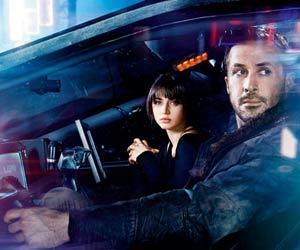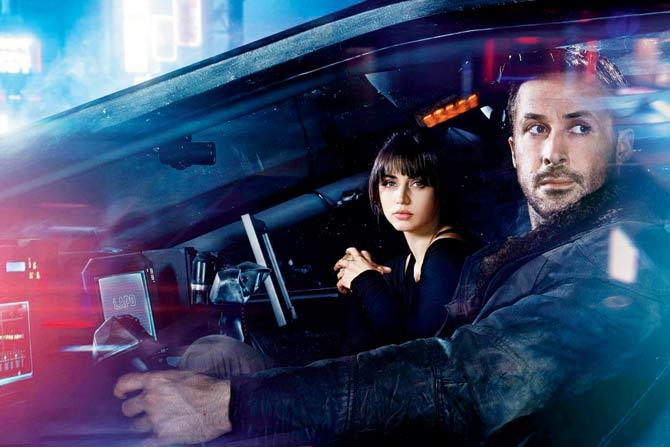Blade Runner 2049 is beautiful sci-fi, but if you're looking to decode the human vs machine debate, you'll have better luck elsewhere

 The weirdest scene in Blade Runner 2049 is a sex scene. Blade runner K is an uncannily human-like and self-aware android; he knows his memories are implants and thus he is not human. His only companion is his computer Joi, who wants to consummate their relationship. She summons a sex worker and projects a holographic image of herself onto the sex worker's body. She becomes the ghost-in-the-sex-machine. At the peak of passion their fingers, hair, and faces slide out of synch: It's surreal and compelling. At the moment of their most human-like interaction, she appears ghostly.
The weirdest scene in Blade Runner 2049 is a sex scene. Blade runner K is an uncannily human-like and self-aware android; he knows his memories are implants and thus he is not human. His only companion is his computer Joi, who wants to consummate their relationship. She summons a sex worker and projects a holographic image of herself onto the sex worker's body. She becomes the ghost-in-the-sex-machine. At the peak of passion their fingers, hair, and faces slide out of synch: It's surreal and compelling. At the moment of their most human-like interaction, she appears ghostly.

Blade Runner 2049 is beautiful to watch, the slow pacing allows your eye-mind to linger over the images, as with a gorgeous painting
ADVERTISEMENT
It's been a few weeks since I watched the film. Since then I've been conflicted. It's beautiful to watch, the slow pacing allows your eye-mind to linger over the images, as with a gorgeous painting. However.
The first problem is that the original Blade Runner wasn't all that great to begin with. It was visually engrossing in a 1980s way, and the villain Rutger Hauer was more attractive than protagonist Harrison Ford; also Sean Young's self-discovery was heart-breaking. However, it was more noir and less science fiction, the way that director Ridley Scott's earlier Alien was more horror and less science fiction (it was like a monster movie trapped on the sets of 2001: A Space Odyssey). I watched the original film in the cinema, irritated by Ford's superfluous narration; a director's cut over two decades later did improve things but the damage had already been done.
Worse, Philip K Dick's novel, Do Androids Dream of Electric Sheep?, was superior to the film. Grab a hold of this science fiction. As with Dick's novels, it's a mind-twister. In it, blade runner Rick Deckard (the hero) is married. Their banal marriage is made tolerable by emotion-enhancing devices that have no effect on the replicants (the androids). Deckard also adores his pet electric sheep. He's still on Earth, been made toxic by nuclear war, though most of humanity has moved to Mars (and other worlds), where replicants are slave labour.
While pursuing six replicants escaped from Mars, Deckard meets Rachel. He is advised by a colleague to have sex with her before "terminating" her. It turns out that Rachel, far from being traumatised, has had sex with half a dozen other blade runners in order to throw them off track - or kill them. The novel's sexual politics are obviously more complex than the film's.
Another bizarre plot twist is the discovery of a parallel police HQ that Deckard never knew existed. It turns out that the replicants have constructed this HQ as a trap for blade runners. The parallel police chief himself is a replicant.
There is a mexican standoff - not with guns, but with the devices to detect replicants. The novel explores not just what it is to be human - both films' main concern - but also the nature of perception, the ethical treatment of sub-normal humans and of animals, and the definition of intimacy.
Dick's novels are psychedelic roller-coasters that usually don't translate well to the screen. I didn't care for Minority Report; the short story it is based upon is far better (also, Steven Spielberg makes mediocre science fiction). In Dick's story, the protagonist is arrested because he tries to amend the minority report, thereby fulfilling its prophesy. The original Total Recall (based on the short story We Can Remember It For You Wholesale) is tolerable because it chooses to be camp. I have postponed watching The Man in the High Castle because the novel impressed me in my youth: Set in an alternative post-World War II America where victorious Germany and Japan have divided up the US, a man sets out looking for a banned book of an alternative history in which America was a winner. Yes, a mind-full.
Fans have said Blade Runner 2049 is the best sequel ever; they may say a movie should be seen on its own terms. They may even point out that director Denis Villeneuve made better science fiction with Arrival. True, and one has to acknowledge the artistry of the landscapes and the colours in Villeneuve's film. And then there's the sex scene - I'm among those who believe non-gratuitous intimacy scenes best define or even reveal a character - that alone is worth the price of admission.
But if you're one of those who believe in Ray Kurzweil's coming technological singularity (when machines will gain human-like consciousness) then a more interesting meditation on what it is that separates humans from machines is Westworld, a TV serial based on the 1973 film written by the late novelist Michael Crichton (The Andromeda Strain, Jurassic Park). TV showrunners Jonathan Nolan and spouse Lisa Joy state that the paradoxes of the TV serial's drama are mined from the novels of Philip K Dick. He would have enjoyed that maze of irony.
Aditya Sinha's crime novel, The CEO Who Lost His Head, is available now. He tweets @autumnshade. Send your feedback to mailbag@mid-day.com
 Subscribe today by clicking the link and stay updated with the latest news!" Click here!
Subscribe today by clicking the link and stay updated with the latest news!" Click here!







